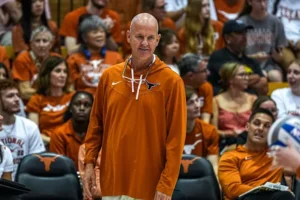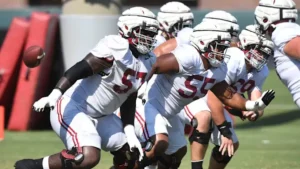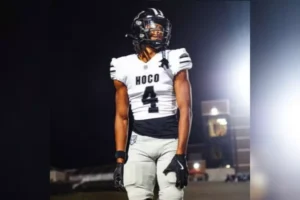
“A Voice for the Silenced: Kyren Lacy’s Agent Speaks Out After Tragedy”
The world of football was shaken to its core with the heartbreaking news of Kyren Lacy’s untimely death. A rising star with a magnetic presence and boundless potential, Lacy’s passing has left a trail of grief across the college football landscape, particularly among LSU fans who had grown to love his passion and toughness on the field. But in the wake of the tragedy, as teammates, coaches, and fans mourn, a scathing and emotional message from Lacy’s agent has pierced through the grief — a bold, unfiltered indictment of the NFL and its practices regarding the treatment and valuation of players like Lacy.
Kyren Lacy, a wide receiver who transferred from Louisiana to LSU and steadily earned respect with his reliability and explosiveness, was working toward an NFL dream that once felt just within reach. Though not projected as a first-round pick, Lacy had drawn interest from scouts who admired his frame, work ethic, and physicality. His performances in Baton Rouge were marked not just by acrobatic catches and clutch moments but by the quiet leadership he brought to the locker room.
His death stunned many, but it was the aftermath — particularly the reaction from his agent — that threw fuel on a fire that had long been simmering within the world of professional football. In a lengthy, emotionally charged statement, Lacy’s agent criticized the NFL system as being “cold, calculating, and indifferent to the mental well-being and human dignity of young athletes.” He alleged that Lacy was “strung along” by teams offering vague interest, placing him under immense pressure while providing little of the clarity or support necessary to make real decisions about his future.
The message, posted to social media just hours after news of Lacy’s death broke, did not mince words.
“We ask these young men to break their bodies for the entertainment of millions, and then we discard them the moment they don’t fit our mold,” the post read. “Kyren was more than a prospect. He was a person. He was hurting. And the people who could’ve helped — who should’ve helped — turned their backs.”
The NFL has yet to publicly respond to the agent’s remarks, but privately, league insiders are said to be rattled. The statement comes at a time when the league has faced growing criticism over its treatment of players in the draft process, particularly those on the margins — talented athletes not guaranteed a spot, often left in limbo during the pre-draft grind that includes physical tests, interviews, and pro days.
Lacy’s agent also alleged that teams gave “mixed signals,” inviting Lacy to interviews and workouts but ghosting him in the crucial weeks leading up to the draft. The silence, according to the agent, took a toll.
“Kyren was working out twice a day, talking to family every night, praying for a shot,” the statement continued. “He felt like he was always almost enough. Do you know how much strength it takes to keep going when no one gives you a straight answer about your future?”
What makes this moment even more haunting is that Lacy had recently spoken to close friends and former teammates about feeling “on edge” and “in the dark” regarding the next steps in his career. In interviews earlier this year, he’d expressed excitement about the next chapter but also admitted that the waiting game was brutal. The pressure of making it to the next level — especially when competing with dozens of equally hungry, equally talented prospects — is something few outside the game truly understand.
LSU head coach Brian Kelly offered words of condolence but also backed the notion that something needs to change.
“Kyren was a warrior,” Kelly said. “He gave everything to this program, to this university. We’re heartbroken. But we also have to ask ourselves hard questions about how we support our players — not just physically, but mentally, emotionally, spiritually.”
Lacy’s family has requested privacy as they process the loss, but his younger brother took to Instagram with a devastatingly simple message: “He wanted to make everyone proud. He didn’t know he already had.”
Teammates have described Lacy as someone who carried burdens for others even while battling his own. “He was the guy who’d pick you up after practice, bring you food when you were hurting,” said former LSU quarterback Garrett Nussmeier. “He smiled through stuff we didn’t even know he was carrying.”
It’s that hidden struggle that seems to be at the center of the agent’s fury — the idea that the NFL, for all its wealth and power, still fails to address the very real mental health challenges that players face as they transition from college to the pros.
“We run these young men through a machine and pretend they’re indestructible,” the agent wrote. “And when they crack under the weight of it all, we call it weakness. It’s not weakness. It’s human.”
The statement concluded with a plea for reform. “If we don’t start treating these players as people — not just assets or liabilities — we’re going to keep losing them. The system isn’t broken. It’s working exactly as designed. That’s the problem.”
In recent years, the NFL has attempted to boost its mental health initiatives, with each team required to employ a mental health professional and increased access to therapy and wellness resources. But critics argue those efforts are uneven at best, and often come too late for players who are not yet under contract.
Lacy’s death, and the subsequent message from his agent, has sparked a wave of discussion on sports talk shows, podcasts, and social media. Former players have weighed in, some sharing their own stories of uncertainty and anxiety during the lead-up to the draft. Others have pointed out the hypocrisy of a system that profits off college athletes while offering few guarantees once their eligibility ends.
The story of Kyren Lacy is not just a tragedy — it is a call to action. A reminder that behind every prospect ranking and highlight reel is a human being navigating hopes, fears, and crushing expectations.
Lacy’s legacy may yet become larger than the stats he posted or the touchdowns he scored. It might live on in how the sport reckons with his loss. It may live in the conversations teams now feel forced to have about player well-being, and in the changes — if any — that follow.
For now, there is only heartbreak. There is only the memory of a player whose smile lit up locker rooms, who never stopped believing in the people around him, even when the world refused to believe in him.
There is the voice of an agent — angry, grieving, and unafraid to speak truth to power — refusing to let the silence swallow another story. And there is the haunting question left behind: what could we have done differently, before it was too late?
Kyren Lacy was 23 years old. He had dreams. He had fears. He had a future. He was more than a player. He was a person. And in the end, the game he loved couldn’t love him back the way it should have.
Maybe now, that will change.





